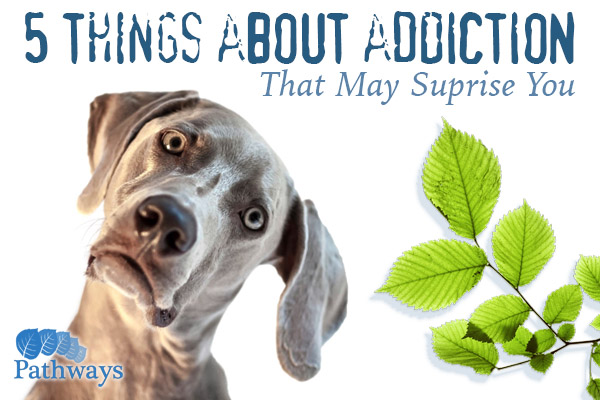According to the American Society of Addiction Medicine, addiction is a chronic disease that affects the brain. It causes changes in the neural pathways that remember the pleasures of activities such as eating, sex, alcohol and drug use, gambling, etc. When triggered, these pleasurable memories cause an overwhelming desire to repeat the experience. Without the proper skills to overcome this desire, and without dealing with the root causes of the issues that led to the addictions to begin with, it’s easy to fall into the cycle of addiction. After all, pleasure is a hard thing to resist.
With this in mind, let’s look at 5 things about addiction that may surprise you.
D.A.R.E. (Drug Abuse Resistance Education) Causes More Harm than Good
Founded by a former police officer with the help of Los Angeles schools, the goal of the D.A.R.E. program is to decrease drug use in schools. Although the program sounds ideal and has great intentions, D.A.R.E. has failed to reach its objectives. Peer reviews and studies have shown that:
- The D.A.R.E. program may actually increase the likelihood for teens to drink and smoke.
- The program possibly increased drug use among teenage girls.
- It was determined “that D.A.R.E. simply didn’t work” in a study done for the U.S. Bureau of Justice Assistance.
Trading Addictions
If a person beats their addiction to drugs or alcohol, but have not dealt with the underlying issues that led to their addictive behavior in the first place, they often find themselves addicted to another drug or substance. This is called cross addiction. It also explains why people often develop a new addiction, such as that to sugary or fatty foods, after completing treatment. Unfortunately, this new addiction often leads the person back to their original drug of choice, starting the cycle all over again.
You Can Be Addicted to Practically Anything
According to Psychology Today, addiction is a condition that occurs when a person ingests a substance or engages in a pleasurable activity to the point that it becomes compulsive and interferes with ordinary life responsibilities.
You really can be addicted to almost anything. Examples of addictive substances include:
- Alcohol
- Drugs: cocaine, heroine, meth-amphetamines, opiates, etc.
- Nicotine
- Caffeine
- Many different prescription medications
Examples of addictive behaviors or activities:
- Gambling
- Sex
- Shopping
- Pornography
- Overeating
- Video games
Many people think that overcoming an addiction to something like gambling can’t be as difficult as overcoming an addiction to nicotine or heroine. However, research shows that gambling addicts may suffer physical withdrawal symptoms that rival those of drug withdrawals. The symptoms include difficulty breathing, heart palpitations, and pain throughout the body, proving that addiction is more about a set of behaviors than the properties of the addictive substances.
Caffeine is another of those “innocent” addictions. In fact, it is often joked about and viewed as not much of a problem. It is so addicting that people often experience problems giving it up even when advised to do so by their health care providers.
Alcoholics Anonymous
Alcoholics Anonymous (AA) is the original 12-step program designed to overcome alcohol addiction. It was adapted to deal with narcotic addictions as well. It is often the first step someone takes when they decide to deal with their substance abuse and addictions. Some people have found success in these 12-step programs, while others have not.
Alcoholics Anonymous has an incredibly strong faith-based component. Acknowledgement of a higher power, often God, and the need to rely on that power to “restore one to sanity” is an integral part of the program. This component can make some people quite uncomfortable. It also encourages people to believe they are incapable of handling the problem on their own, without a higher power.
Contrary to AA’s belief “once an alcoholic, always an alcoholic,” we at Pathways believe that with proper treatment and learning to deal with the root cause of the problem, the need to take part in addictive behaviors goes away.
Treating the Real Cause of Addiction
Since addictions cause problems that disrupt people’s lives, it’s easy to jump to the conclusion that the addiction is the problem. Following that logic, once the addiction is addressed and the addictive behavior has ceased, then the problem is fixed. The problem with this way of thinking, however, is that the “real” problem has not been dealt with. This means that the addictive behavior is likely to return as the person continues to seek a way to relieve the “real” pain and discomfort.
In his book, Chasing the Scream: The First and Last Days in the War on Drugs, Johann Hari shares that addiction actually has very little to do with the drugs themselves. Instead, he argues that the real cause is the lack of proper bonds with other humans. In other words, people are forming a bond to their addiction to fill the void in that area of their lives.
Get Real Help with Pathways Real Life Recovery Program
Pathways Real Life Recovery Program embraces a holistic approach to the treatment of addictions. We treat the entire person, addressing the reason for the addiction which then eliminates the problematic addictive behavior. We work with adolescents and adults, both men and women, to create a customized and individualized treatment plan. We walk with them through every step of the journey, equipping them with the tools and skills they need to achieve a purpose-filled life.
Pathways remains at their side, monitoring their progress for up to three years after program completion. Call Pathways Real Life Recovery today to learn how you can use our strength-based program to live a life filled with light, confidence and peace.
- Choosing a Drug and Alcohol Rehab Center: What to Consider - April 18, 2024
- Substance Use and Co-Occurring Mental Disorders - March 28, 2024
- Embrace a New Start with Inpatient Treatment at Pathways - March 4, 2024


